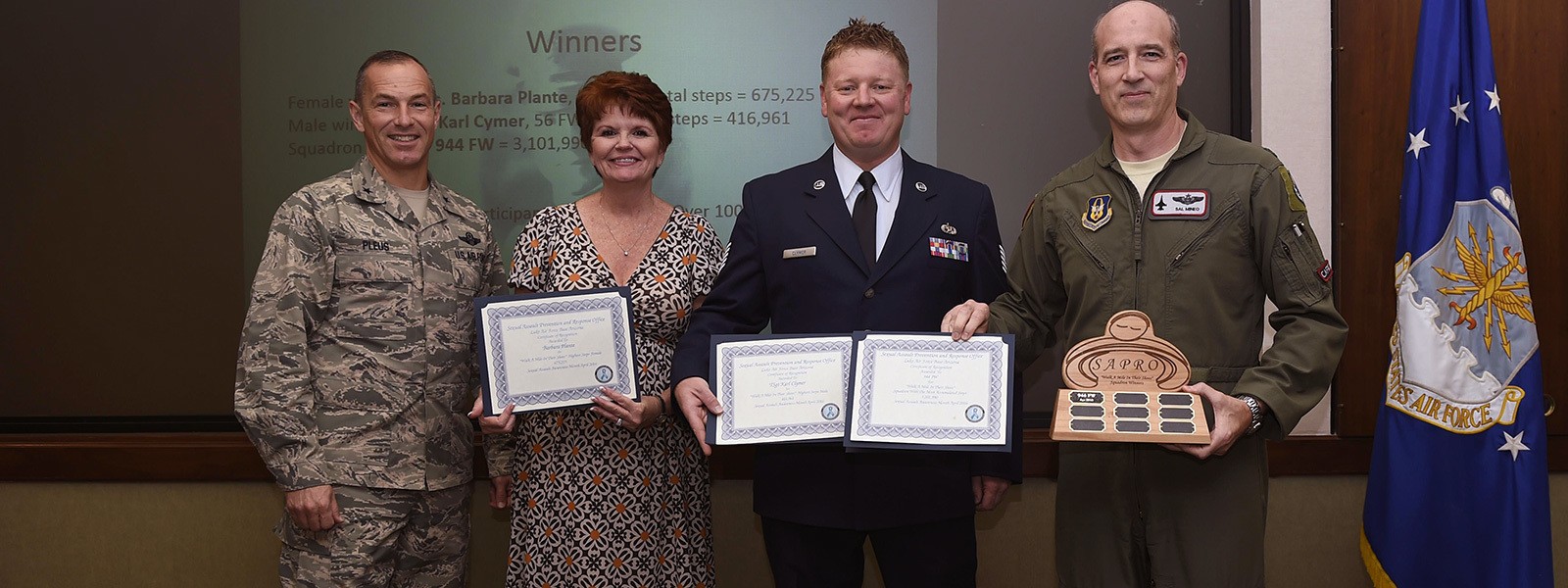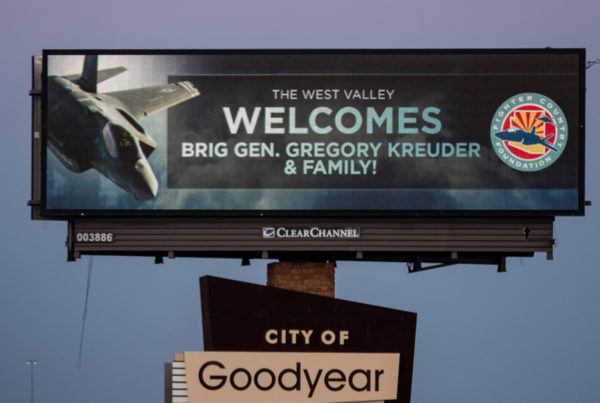By Jen Fifield, Arizona Republic. Published on Dec 22, 2018. Photos courtesy of Nick Oza & David Wallace/The Republic.
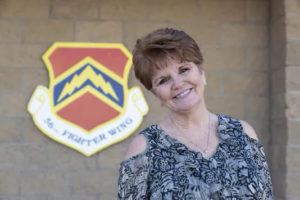
Portrait of Barbara Plante, Deputy Director of Luke Air Force Base’s Community Initiatives Team, who has worked at Luke for 26 years. She retires this month.
There were goats grazing along Litchfield Road when Barbara Plante first started taking it north from Interstate 10 to get to work at Luke Air Force Base in 1994.
There was no Loop 101 or Loop 303. There was no Westgate Entertainment District and nothing east on Glendale Avenue for miles.
Over the years, Plante watched as construction has crept closer and closer to Luke.
It has been part of her job to manage that growth.
When people think of Luke Air Force Base in the West Valley, they may not think of Plante. They may think of Rusty Mitchell, the civilian face of the base and the director of the Community Initiatives Team.
But Plante, deputy director of the team, is Mitchell’s secret weapon.
As Mitchell has worked the crowds over the years, behind the scenes, Plante has been surreptitiously building up support for the base. Her commitment to educating city officials, real estate professionals, politicians and residents about the state laws restricting development around the base and why they are important, Mitchell said, has helped secure Luke in the Valley for decades to come.
Plante is retiring this month, after 35 years serving the U.S. Air Force — 26 of those at Luke, and 20 of those also in the Reserve.
In a good place
 Plante believes she is leaving Luke in a good place.
Plante believes she is leaving Luke in a good place.
Luke has so much support from the surrounding community, she said, it’s an envy of the U.S. Air Force. Arizona is one of the few states that has enacted laws to restrict development around its military bases, she said, and those laws will still be followed.
But as Mitchell nears retirement as well, he and Plante recognize there will be a transition period as new team members take their place. Mitchell swears it will be seamless. He recognizes that the stakes are high.
Luke is home to one of the largest fighter wings in the world, the 56th Fighter Wing, in the middle of a growing metropolitan area. Without Luke representatives who know the ropes, the trust between Luke and local officials could be lost, putting the mission in jeopardy.
‘She’s how it’s possible’
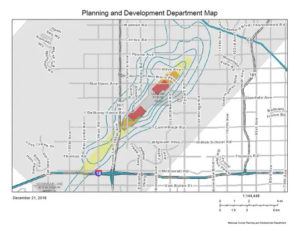 The Air Force wants to have a safe and supportive environment around its bases.
The Air Force wants to have a safe and supportive environment around its bases.
Development should be restricted in certain areas of the flight path and around the base because of the potential for crashes and noise. Tall buildings, industrial buildings with emissions, even certain farming that attracts birds, can all impede Luke’s mission of training pilots, Plante said.
As Congress considers which bases to close and realign every eight years through a process called Base Realignment and Closure, one aspect considered is development around a base. That was what Williams Air Force Base officials thought may have, in part, led to the closure of that base in Mesa in the 1990s.
Mitchell and Plante are in charge of making sure local leaders realize the base is valuable to their communities and helping them understand how they can keep it there. The base adds 15,070 jobs, $923 million in wages, and $2.4 billion in direct and indirect economic impact to the state, according to a 2017 study by the Maguire Company, commissioned by the Governor’s Office.
When you meet Mitchell and Plante, you understand how they’ve been able to accomplish this together.
He’s commanding, she’s endearing. He refers you to her when he doesn’t know something, and she does the same. They interrupt one another, but with benevolence.
This is actually Mitchell’s second full-time job. He’s also a captain at United Airlines. When you ask him how that’s possible, he looks at Plante.
“She’s how it’s possible,” he said.
She smiles coyly. She reluctantly agreed to do a media interview.
But Mitchell says she was key to bringing his team to the next level.
“Her personality and building of relationships allowed cities to look beyond their self-interests to the greater good of the community,” Mitchell said.
High pressure in early years
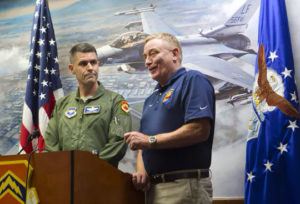 Luke created the Community Initiatives Team in 2003. Not every base has one. Mitchell refers to it as “community relations on steroids.”
Luke created the Community Initiatives Team in 2003. Not every base has one. Mitchell refers to it as “community relations on steroids.”
In their early days working together, him as the leader of the new team and her as his contact on the public affairs team, pressure was high to build trust around the base.
As new housing developments inched closer to Luke, the state enacted a law in 2001 that restricted housing around military bases and their flight zones. But by 2008, Maricopa County still hadn’t changed its General Plan to comply with the law and had approved nearly 100 permits in restricted zones. Arizona Attorney General Terry Goddard sued, and the county eventually complied.
At the same time, some elected officials in a few West Valley cities, like El Mirage and Surprise, were having a hard time seeing the benefit of having Luke around.
Meanwhile, Luke, which had historically trained pilots on F-15s and F-16s, was trying to secure the F-35 program.
Former El Mirage Mayor Lana Mook, who wasn’t yet in office, said the City Council at the time had made it a point to fight against the F-35 program. She ran for office partly “because of that nonsense.”
She contacted Mitchell, who connected her with other base supporters, such as Glendale Mayor Elaine Scruggs and Goodyear Mayor Georgia Lord.
“I got together with them and we said ‘hey, let’s do something about this crap,’ and really put in a collective effort,” Mook said.
Mook said Plante, who is “Rusty’s right hand,” has been instrumental in informing the public.
“Different builders and developers have tried over the years to get closer to what the encroachment line is,” she said. “She is an integral part of how people are educated concerning those kinds of things.”
‘Love to see all cows and cactus’
Plante was on the public affairs team for Luke from 1995 until 2013, except for when she was deployed to Afghanistan in 2011 and 2012.
She welcomed local officials to the base, educated the public, and helped Luke with recruitment.
In 2013, Mitchell “stole” Plante from public affairs to help lead his team. That’s when she dug into learning state laws and zoning.
When Plante gets talking about her work, it’s hard to get her to stop.
State law requires counties and cities to establish general plans that comply with the high noise and accident potential generated by Luke activities. Plante explains that Luke wants to see graduated development around the base, with lower-density buildings nearby, and higher-density farther out.
Plante meets quarterly with cities’ planning and zoning staff to talk about plans and address issues. Mitchell meets quarterly with the base’s general and elected officials in the Luke West Valley Council.
At this point, city officials have agreed to notify Luke whenever a development is proposed near the base before it moves forward. That’s not a requirement and not something that happens at other bases across the country, they said.
“It took a while,” Mitchell said.
Luke tries to be a good neighbor, even when a proposed development isn’t exactly what the base wants, Plante said. They avoid saying ‘no’ and instead find ways to say ‘yes.’
“We would love to see all cows and cactus,” she said. “But we know that’s not possible.”
Plante is such a people person, and so well-informed, that she can “open any line of communication,” Goodyear’s mayor said.
She and Mitchell both serve as a great go-between, since higher-rank military officials can be intimidating, Lord said.
‘Not just about the work’
 Mitchell and Plante said many of their relationships with local leaders have become very close. They have been invited to weddings and received baby announcements.
Mitchell and Plante said many of their relationships with local leaders have become very close. They have been invited to weddings and received baby announcements.
“It’s not just about the work,” Plante said. “It’s about families.”
They both make appearances at educational classes hosted by the West Maricopa Association of Realtors, to educate real estate professionals. They want people in the field to be open with buyers about the noise from the base.
They say their work educating realtors is partly why the base doesn’t see many noise complaints — about 77 this year so far. People know what they’re getting.
This work is ongoing. A new subdivision called Marbella Ranch is going up just outside of the noise restrictions, on Glendale Avenue.
Mitchell and Plante said they stopped by the sales office recently and casually asked someone in the sales office whether there was sound from Luke. Mitchell said he was pleased when the person told them, yes, there would be noise.
Part of the reason people trust Plante, Mitchell said, is because of her attention to detail. Her state statute book is “in tatters,” because of how often she uses it, he said.
Plante doesn’t shy away from this characterization.
“I absolutely think that the devil is in the details,” she said. “I say that all the time around here.”
Part of her obsession comes from how important it is for the base to be consistent, she said. Their team works with 11 cities, the county and the state. If it tells one jurisdiction one thing, and one another, that doesn’t build trust.
Future of Luke
Plante is humble about what she has been able to do for the base, but every once in a while she lets on that she realizes the importance of her work.
When she first started in the office, she realized it didn’t have much written down. She created reference guides on important topics that can now be used when she leaves.
“None of that had been done because they didn’t have me,” she said, laughing.
Their team is able to maintain stability for Luke, when base commanders transfer in and out every two years, and elected officials rotate often.
Mayors who have worked with Mitchell and Plante say they will be sad when they’re both gone. But they say they have built a strong enough foundation for the new team to come in.
Lord said she hopes new leaders will be just as open and honest as they have been.
“They have to keep communicating,” she said.

